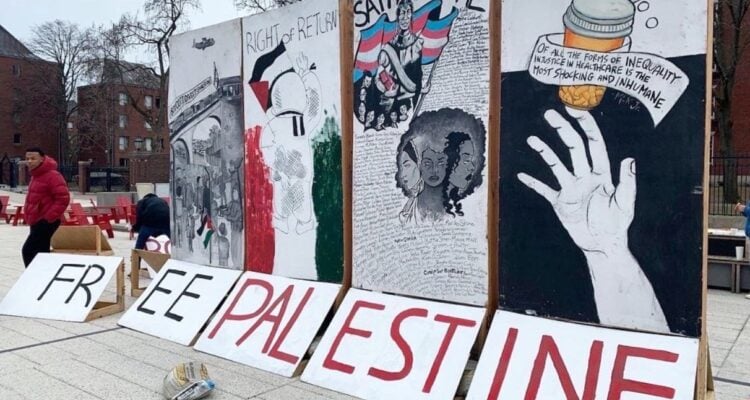The landmark report comes two weeks after interim president Alan Garber cut a deal with a student anti-Zionist group which ended a ‘Gaza Solidarity Encampment.’
By Dion J. Pierre, The Algemeiner
Harvard University has announced that it will no longer take sides in polarizing political debates, a decision which follows months of condemnation from Harvard students and faculty of Israel’s policies in the Palestinian territories and its war to eradicate Hamas.
The university policy, described as “institutional neutrality,” is the final recommendation of a report issued by a faculty group which interim president Alan M. Garber convened to study whether Harvard “should use its official voice to address matters of social and political significance.” According to The Harvard Crimson, Garber, as well as the Harvard Corporation, has embraced it.
“The university and its leaders should not, however, issue official statements about public matters that do not directly affect the university’s core function,” the report says, citing reasons which crystallized the group’s consensus and outlining its expectations of high-level, non-faculty Harvard officials.
“Faculty members, speaking for themselves, have expertise in the respective domains of knowledge, and they may often speak about what they know. In so doing, however, they do not speak for the university,” it continues.
“The university’s leaders are hired for their skill in leading at an institution of higher education, not their expertise in public affairs. When speaking in their official roles, therefore, they should restrict themselves to matters within their area of institutional expertise and responsibility: the running of a university.”
The report also argues that Harvard’s “integrity and credibility” are “compromised” when it privileges one point of view over another and that doing so sometimes offends groups it aims to “comfort.” Moreover, it emphasizes that Harvard’s business is education, not politics.
“If the university and its leaders become accustomed to issuing official statements about matters beyond the core function of the university, they will inevitably come under intense pressure to do so from multiple, competing sides on nearly every imaginable issue of the day,” it continues.
“The university is not a government, tasked with engaging the full range of foreign and domestic policy issues, and its leaders are not, and must not be, selected for their personal political beliefs.”
The landmark report comes two weeks after interim president Alan Garber cut a deal with a student anti-Zionist group which ended a “Gaza Solidarity Encampment” that had been erected at Harvard Yard.
While Harvard made some concessions — including promising the group a meeting with the Harvard Corporation Committee on Shareholder Responsibility to discuss the possibility of divestment from companies linked to Israel and factoring mitigating circumstances into disciplinary decisions rendered in cases brought against students who illegally occupied school property — it refused to adopt a boycott of Israel as a condition of the students’ going home for the summer.
Harvard struggled in its responses to Hamas’ massacre across southern Israel on Oct. 7, a wavering that critics have attributed to left-wing bias among Harvard leaders.
The school, led at the time by a president who later resigned after being outed as a serial plagiarist, was allegedly late in condemning the terrorist group’s atrocities and became a newfound defender of unbridled free speech — an idea championed by conservative academics and intellectuals at a time when elite universities allegedly took steps to squelch free speech — when over two dozen groups issued a statement blaming Israel for the violence.
It is not clear how “institutional neutrality” will bear on the welfare of Harvard’s Jewish students, who, a recently filed lawsuit alleges, have been victims of and witnesses to vicious incidents of antisemitism.
In the hours after the events of Oct. 7, 31 student groups at Harvard issued a statement blaming Israel for the attack and accusing the Jewish state of operating an “open air prison” in Gaza.
Later, students stormed academic buildings chanting “globalize the intifada,” a mob followed and surrounded a Jewish graduate student, screaming “Shame! Shame! Shame!” into his ears, and the Harvard Law School student government passed a resolution that falsely accused Israel of genocide and ethnic cleansing.
In December, former Harvard president Claudine Gay told a US congressional committee that calling for a genocide of Jews living in Israel would only violate school rules “depending on the context.”
In February, Harvard Faculty and Staff for Justice in Palestine — a spinoff of a student group allegedly linked to terrorist organizations — shared an antisemitic cartoon on social media which showed a left-hand tattooed with a Star of David, containing a dollar sign at its center, dangling a Black man and an Arab man from a noose.
The group’s former leader, history professor Walter Johnson, later participated in a “Gaza encampment” protest in which students clamored for a boycott of Israel.





